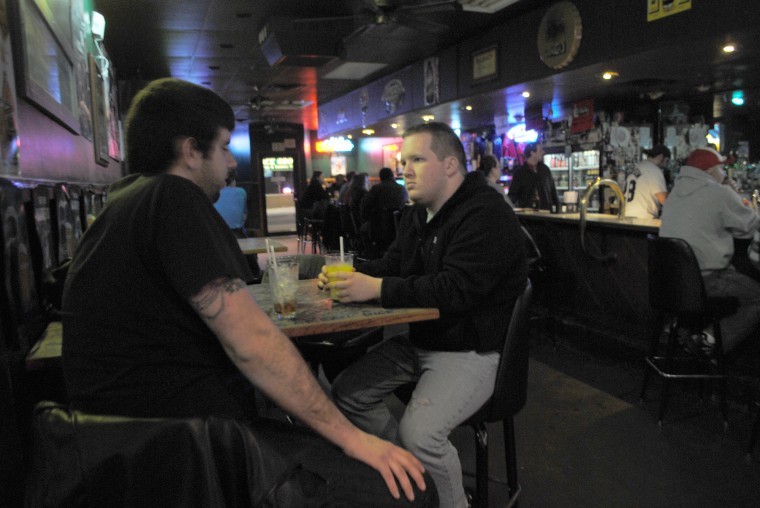Study space series: Worst places to study on campus
Andrew Dodd and Tim Lydon have a drink at Lord Stanley located at 142 E Lincoln Hwy. Bars are just one place in DeKalb that students are not condusive to studying
March 31, 2011
Annoyed by noise when you’re trying to study? Turn into a chatterbox when friends are around? Do you get lost in your thoughts staring at a poster on a wall? Everyone prefers different studying environments, but this week’s edition of the Study Space Series asks, “What are the worst places to study?”
Follow the Northern Star through its weekly profiles of study locations on campus and around DeKalb to find the place that works best for you.
ACCESS director Shevawn Eaton said study environment preference varies; what works for one student may not work for another.
“It’s different for everybody,” she said. “You have to learn yourself first.”
Eaton said she heard from a lot of students during the midsemester check event in February that they had trouble studying in their rooms.
“If you can’t study in [your] room, don’t study in your room,” she said. “It’s that simple.”
If a student is very social in their residence hall or apartment and often attracting visits, they might want to go somewhere to study where their friends can’t find them, Eaton said.
Tim Godsey, post baccalaureate geography major, said the last place he’d want to study would be a friend’s apartment or residence hall room.
“You’re going to sit there and talk…and lose track of time,” he said.
If a student finds themselves easily distracted in class by voices in the hallway, they might want to avoid places where there are a lot of people when trying to study, Eaton said.
Sophomore psychology major Alex Rodriguez is one of those students. He said he doesn’t like to study in places with a lot of traffic because when he can see people moving around him out of the corner of his eye it distracts him.
For that reason, Rodriguez said the last place he would want to study on campus would be the Grant Hall lobby.
“It’s noisy, you always get people coming in and out,” he said. “It’s distracting.”
Sam Pasholk, junior physical education major, said he avoids places that have a lot of “busyness…with a lot of things going on, a lot of people walking around or a lot of things to look at.”
Pasholk said he looks for less traveled areas.
“I’d have to go somewhere where no one would [be],” he said.
Senior geology major Kelsey Wiora said she also doesn’t like to study in places with too many possible visual diversions.
“I don’t like a lot of decorations,” she said. “If there’s too much too look at, I get distracted.”
Your bed also may not be a good place to study, according to the Ten Traps of Studying on the Coaching for Academic Success website. The location in which you study should be as similar to the test environment as possible because recall is affected by context.
Eaton said some students who try to study in their bed might fall asleep.
Students should find the “best possible environment” in which to study their most difficult subjects, Eaton said.
For her, that meant absolute silence when she needed to study Calculus in college.
Senior English major Megan Pettitt said she avoids places with a lot of distracting noise like cafeterias.
“The last place I’d want to study is probably a bar,” Pettitt said. “I’d never make it past page one…it’s too loud, there’s too much temptation.”
Eaton also said some students might be distracted by silence, like in the library.
Some students can’t agree whether they find the library a good or bad place to study.
Senior geology major Megan Saundifer said she prefers not to study in the library because she finds it too loud.
“People tend to forget that it’s a library and that you have to be quiet,” she said. “When a library has a specific room for quiet study, something’s wrong.”
Rodriguez said he likes to study in some places in the library.
“If it’s noisy, you just move, go somewhere else,” he said.
Eaton said she learned in graduate school that music helps her concentrate when she is studying.
“It’s just there in the background distracting some part of you,” Eaton said.
For Gosdey, he can focus on studying “pretty much anywhere” when he has his headphones.
Eaton said she has also heard many students say that they plan to study when they go home for a weekend, but end up finding it not to be a good environment.
Students need to be realistic about how much studying they will do if they go home for the weekend. If a student knows they will not study when they go home, they should put in extra study time before they leave, Eaton said.
Eaton said students should experiment to find out what study locations work for them. All of the ‘rules’ about studying environments are just suggestions. Every student needs a different level of distraction, noise, traffic and scenery.
“The longer I’m in the business, the more I see that,” Eaton said.







